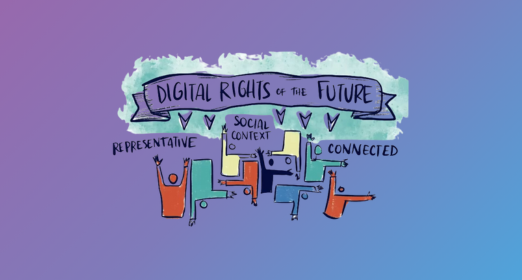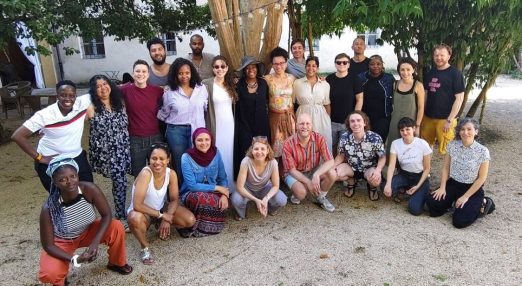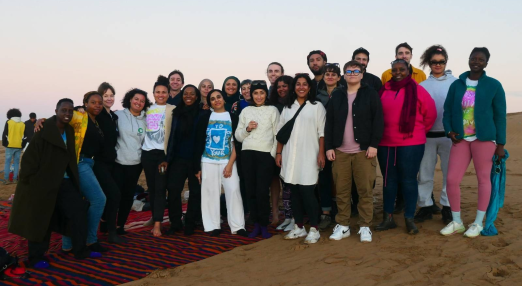Decolonising the digital rights field in Europe: Call for feedback on our first draft programme
EDRi and the Digital Freedom Fund (DFF) are looking for your input on a draft programme for an initial decolonising process for the digital rights field in Europe. We want to hear from you!
The consultation on the draft decolonising programme for the digital rights field in Europe has now closed. The Digital Freedom Fund and European Digital Rights (EDRi) would like to thank all the individuals who generously contributed their time and expertise, providing invaluable feedback.
In the coming weeks, we will work to incorporate this feedback into the revised programme. Our goal is to get closer to an ambitious, disruptive, imaginative decolonising agenda. Nonetheless, we also recognise that, as decolonising is a process, the ‘final’ agenda will also be a roadmap meant to be piloted, iterated, and possibly revisited after an initial period of implementation.
Stay tuned for the launch of the revised programme later this year!
This draft outline is one of the many outcomes of a two-year process of collective design with 30 participants from racial and social justice and digital rights organisations, hoping to address power dynamics in the field and imagine a vision for anti-colonial digital futures.
The outline is a draft summarising plans for the decolonising programme that we hope to develop. It is not perfect or complete. It’s open to changes and new additions. This outline will undergo a series of consultations with communities, individuals, collectives, and organisations who were not part of the original process. We hope to critique, build, and develop these ideas, hopefully getting closer to an ambitious, disruptive, imaginative decolonising agenda. We also recognise that, as decolonising is a process, the ‘final’ agenda will also be a roadmap meant to be piloted and iterated, possibly revisited after a certain period of implementation.
We have provided the programme in a range of formats in the link below:
We are now looking for feedback from a wider community on how to dismantle power structures in the digital rights field.
In addition to conversations with people working toward transformative change in many fields, we are holding an open consultation for anyone who would like to input.
Answer the consultationMore about decolonising digital rights field in Europe
Decolonising the digital rights field in Europe is a design process to build a decolonising programme for the digital rights field in Europe. 30 participants from the digital rights field and social, economic and racial justice groups are co-designing a programme to address power dynamics in the field and imagine a vision for an anti-colonial digital future.
-

Decolonising digital rights
European Digital Rights (EDRi) and its partner Digital Freedom Fund (DFF) initiated the decolonising digital rights initiative in 2020, which aims to design a process to develop a...
-

“Take it personal, and don´t”: changing the decolonising process and letting ourselves be changed
This blog reviews the decolonising process so far and what we've been upto since our last communication, shared in December last year. It adds detail to how we are...
-

Decolonising Digital Rights: a process imbued with love
This blog reflects on the end of the design phase of the decolonising digital rights in Europe process. It discusses our learnings and the next steps of the...
Our goal is to initiate a process that challenges the structural causes of oppression such as racism, sexism, ableism, homophobia, transphobia, imperialism, and class inequality to work towards a digital rights field that centres on rights and justice for all.
One outcome of this process is to put forward a programme – an ecosystem of initiatives, activities, and elements – an agenda, for how to shift power and decolonise the digital rights field in Europe. In the programme, we present some concrete ideas of how to initiate structural change in the digital rights field.
This is the outline draft of that programme: our very first draft and attempt to put to paper the decolonising programme we have collectively designed.
The process so far
In 2020, the Digital Freedom Fund (DFF) and European Digital Rights (EDRi) kicked off the Decolonising Digital Rights Field in Europe process. Initiated by DFF’s founder and former director Nani Jansen Reventlow, the process sought to address the power structures within the European digital rights space, structures impacting field composition, how resources are allocated, how agendas are set, and crucially, why the people most directly impacted by data-driven harms are excluded from the space.
From June 2021 until December 2022, 30 participants from racial, social, and economic justice organisations and digital rights organisations all over Europe and beyond – as well as researchers – worked together to design a programme towards decolonising the digital rights field in Europe. From funding and organisational structures, programmatic development to partnerships frameworks and how public engagement is done, the process working groups worked to identify what the ideal situation would be, what needs to change, and how to change it. The “how to change it” became the content for the decolonising programme.
Who has been involved?
This process has included more than 30 people and roughly 24 organisations working on racial and social justice issues, as well as organisations from the current digital rights field and funders. This outline draft is the product of collective work from those 30 participants, rather than DFF and EDRi. Read about the core participants here.
Building an imaginative, iterative process
Rarely do social justice movements get the space to reflect, to re-imagine, to rebuild. That’s why this has been such a demanding process, we have been forced – not only to critique our movements – but also try to build otherwise. As in, in the space of a world, or a field, organised with certain power dynamics, what would we put instead? What would that look like?
We need to resist toxic cultures of objectivity and perfectionism, and instead build comfort with critique, reflection, consultation, and constant iteration. We’ve tried to resist linearity in our process, understanding that our ideas need to be unpacked, unravelled, and built anew, and within that process itself comes the change we hope to see. We look forward to engaging more people in this process through consultations and ongoing work.
As such, the following outline is a first draft of the decolonising programme that we hope to present in full later in 2023. It is not perfect or complete. It’s open to changes and new additions. This outline will undergo a series of consultations with communities, individuals, collectives, and organisations who were not part of the original process. We hope to critique, build, and develop on these ideas, hopefully getting closer to an ambitious, disruptive, imaginative agenda of decolonisation.
The consultations
We are seeking to expand our community and engage people who have not been part of the initial decolonising design process. We see the consultation as an ongoing and iterative process and we are hoping to create space for people to continue to inform the shape and nature of the programme.
We will be holding one on one conversations, inviting written feedback and a opening a public consultation about the outline draft.
Answer the consultation
In particular, where we reach out to specific contributors, we offer a stipend for participation.
Specifically looking to what the gaps in our outline programme are, we are looking to iteratively incorporate and review the programme according to the feedback we get.
We commit to giving proper attribution to people any ideas that surface in the consultation that we end up integrating into the programme, unless they would prefer to remain anonymous.
Next steps: future of the process
Beyond the consultations, there are still many pending questions of implementation. To ground the next steps of the decolonising process in decolonising principles, we will work toward a longer-term transition plan for how this work will be collectively implemented and owned.
We hope that the fruits of this collective design can continue to engage more people, communities, and organisations, especially those most affected by digital discrimination, surveillance and extraction.
While EDRi and DFF have a role to play and hope to continue to be a part of a wider process, we acknowledge that EDRi and DFF are not the best placed to lead this process in the long run. We know organisations that have a long tradition and extended knowledge and practices of anti-colonial, antiracist, queer, transfeminist, and anticapitalist organisational work would be best placed to take it further.


